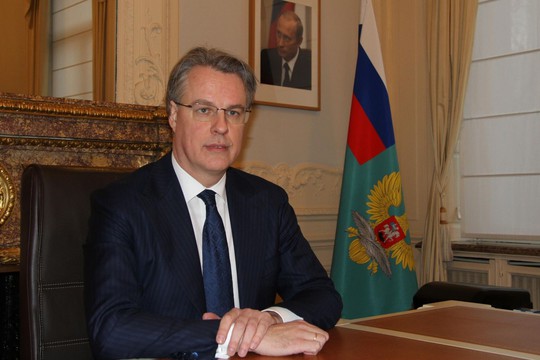Kirill Logvinov
Photo: RIA Novosti
The European Union may continue sanctions against Russia even if the United States decides to ease them, Kirill Logvinov, director of the Russian Foreign Ministry’s Department of International Organizations, told TASS in an interview.
When asked whether Brussels would follow Washington's lead if sanctions were relaxed, Logvinov suggested that such reasoning assumes the European Union operates purely from a standpoint of common sense. He pointed to past examples of the EU's contradictory logic. "If the Americans opt for a softening of sanctions, I wouldn’t be surprised if the Europeans maintain their previous stance," the diplomat remarked. "Any abandonment of these sanctions would only be possible if the EU ceases to view illegitimate sanctions as a tool of foreign policy, let alone an outright rejection of confronting Russia," he added.
Logvinov further criticized the EU’s approach, citing last year’s decision to open the European market to Ukrainian agricultural products, which he argued hurt European producers. He also mentioned Brussels' stance on the sabotage of the Nord Stream pipeline, which, he claimed, follows the same pattern. "In other words, the EU political elite rarely, if ever, considers the interests of ordinary Europeans," Logvinov concluded.
The EU missed an opportunity to change its stance on Russia, and Brussels is heading towards self-sabotage, Kirill Logvinov told TASS.
"Many experts reasonably believed that after the arrival of the new American administration, the Europeans would reassess many issues. As we can see, it did not happen. Moreover, it seems to me that a convenient moment for Brussels has been missed," he said. "As for Brussels' determination to follow through, it is rather a path towards self-destruction of the EU."
Commenting on the EU countries' view on potential ways to resolve the Ukrainian crisis in the current conditions of the international agenda, Logvinov said that in Europe "they are focusing not so much on Zelensky or Ukraine, but on a long-term confrontation with our country."
"In recent years, massive resources have been redirected from the 'integration elements' of the European economic area budget to this," the diplomat said.
He also commented on the EU’s position during a February 24 vote at an emergency special session of the UN General Assembly for a draft resolution on the conflict in Ukraine. "It's as if Biden is still in the White House," Logvinov said. "This means that for the EU there is no direct link between the prospects of finding political and diplomatic ways to resolve the Ukrainian crisis, on one hand, and their course towards countering the so-called Russian threat, on the other."
A number of European politicians express regret over not accepting Russian President Vladimir Putin's security proposals in late 2021, Kirill Logvinov said.
"I know that some officials in the EU later regretted rejecting Russia's proposals on European security at the end of 2021. However, in my view, the key issue is that members of Europe’s current political elite are unable to truly appreciate the fact that Europe lived in peace for 80 years," he pointed out.
"I’m not even saying that the very emergence of a European integration project was made possible by the peace that had been achieved on the continent through the immense sacrifices made by the Soviet people," Logvinov emphasized.
"Unfortunately, top EU officials will realize that the current policy of confrontation against Russia will lead nowhere only after they experience the full impact of all the negative consequences of their bet on efforts to combat the so-called ‘Russian threat’," the diplomat asserted.
"As for the collapse of the system of international relations, it is more likely the result of the fact that Europeans continue to live in their own imaginary world, where they are the only ones that have their place in the sun, while others must obey, or, even better, serve them," Logvinov added.
European businesses expect that Russia will quickly move on and pardon everything, but the approach to the return of any brand will be case-specific, Kirill Logvinov told TASS.
"Let's be blunt: firstly, many in the West were genuinely convinced that Russia would not withstand the sanctions pressure in the first months of the special military operation in Ukraine, and therefore, they say, would not go anywhere and would ask the European businesses to return on their own terms," said the diplomat. "Secondly, and this is indeed the case, the Europeans are still thinking that our country will quickly forgive and forget everything, as has happened in history."
"Therefore, I am confident that our respective decisions will be made individually, and we will take into account the interests of Russian manufacturers whose products have been able to replace Western analogues," noted Logvinov.
At the same time, the Director of the Russian Foreign Ministry’s Department of International Organizations mentioned that he "would not forget the flight of Europeans from the Russian market."
"We did not force anyone out of our market," he recalled. "The relevant decisions were made by the Western economic operators deliberately and individually. Some, he said, "got scared and left immediately, while others stayed."
"But weren't those who stayed, and among them there are large firms, pressured by Brussels or national capitals? I'm sure they were," the diplomat said.
"This means that the decision to leave was driven not only by fear of the negative consequences of sanctions, but also by the personal views of certain Western companies’ management towards Russia, which has made a sovereign choice to prioritize its security.".
The European Union has no plans to restart cooperation with Russia in the field of combating terrorism, Kirill Logvinov told TASS.
"We have not received any relevant proposals from the EU. And I don't think we will receive any in the near future," said the diplomat in response to a question about whether the EU intended to resume dialogue with Russia, considering the ongoing situation surrounding Syria.
read more in our Telegram-channel https://t.me/The_International_Affairs

 10:33 01.04.2025 •
10:33 01.04.2025 •























